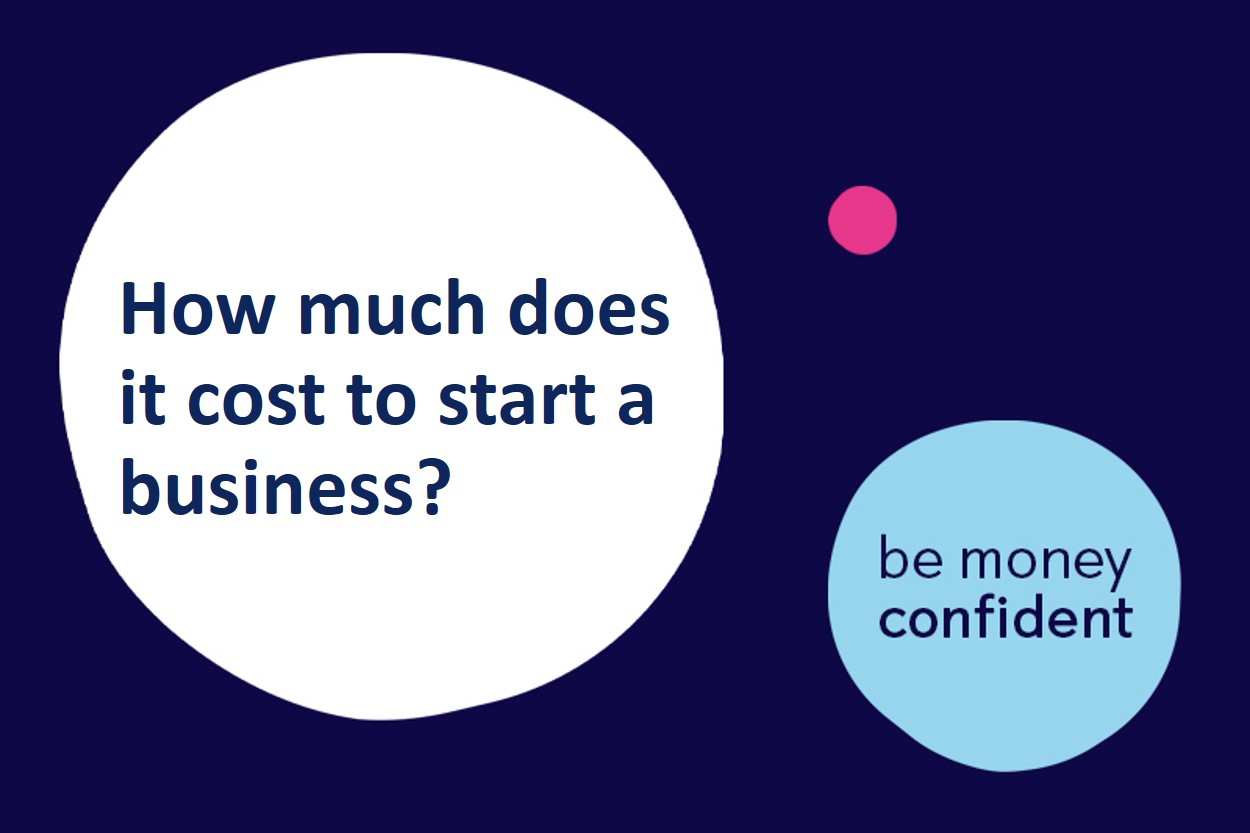Together we can end domestic abuse.
How much does it cost to start a business?

How much does it cost to start a business?
January 2022
Starting your own business is an exciting adventure. Being your own boss brings a huge sense of satisfaction and achievement. But it can be a struggle when you’re overrun with unforeseen costs.
So how much does it cost to start a business? Some research suggests on average UK start-ups budget £5,000 to launch (source: The Company Warehouse). But the truth is there’s no one simple answer to this. However, the following can help you plan for success by highlighting the costs you may need to consider.
Common business start-up costs
Start-up costs will vary depending on the type of business you’re launching. If you’re a graphic designer you could work from home so your only main set up costs are your laptop, a wi-fi connection and perhaps a website advertising your work (and lots of tea probably). But, if you’re a builder there are other items such as equipment, supplies, labour (and even more tea) that must be factored in.
And it’s not just the immediate costs you need to be aware of. According to a study the average UK start-up spends £22,756 in their first year (source: Geniac). So it’s worthwhile thinking about how much money you’ll need in the first 12 months and beyond.
Here then is a summary of costs that you may need to plan for.
Start-up expenses
These are the costs that you incur to get your business up and running before you’ve even started making any money.
They are sometimes called ‘sunk costs’ because you cannot get them back no matter how much you sell. This should not put you off though as they are important for laying the foundations of a successful business. Examples include:
Registering your business: depends on whether you are a sole trader, partnership or limited company - take a look at our articles The different types of UK businesses explained and Registering your business for more information
Professional fees: accountants and consultants to help with the business plan, registering your business or securing funds
Marketing: logo, website, business cards, social media, advertising, brochures etc
Recruitment fees: cost of hiring employees
Assets
These are basically the ‘things’ you invest in and keep to help run the business. They are often items that have a value and could be sold on. Examples of this are premises (if you have bought them), vehicles, machinery and equipment.
Equipment costs will very much depend on your business. For example, a baker will require a very different set of assets to a window cleaner or a hairdresser.
Whilst it’s important you account for assets in your start-up calculations, under HMRC’s Annual Investment Allowance you can sometimes offset their cost from your profit when calculating your tax.
Ongoing costs
These are the costs that are paid regularly and that you can usually plan for, such as:
Rent on premises
Business rates - have a look at our article Business rates explained to help determine how this is calculated
Utilities - gas, electricity, water
Interest on business loans
Regular staff cost
Insurance
Marketing - ongoing cost of attracting customers (e.g. the upkeep of your website and social media, newspaper ads, a stand at an event, or leafleting)
Variable costs
These are costs that are determined by how much goods or services you are producing. For instance, if you make jewellery the cost of materials (beads, gems, clasps, wire) will increase the more you make. If your business is very busy at particular times of the year you could include here the increase in short term staffing costs.
General expenses
These are best described as small, infrequent purchases that are not due to a particular sale but instead is used across the business. This could include travel to meetings, or office supplies, and those tea bags we mentioned earlier.
These may seem rather daunting but you may find that you can save money by doing many of the administration tasks yourself, or share them with your business partner. But whatever your running cost calculations it is sensible to overestimate them to ensure you have enough cash flow to keep your business afloat.
Budgeting tips
Find out what loans or grants are available
Work from home instead of renting premises
Take advantage of credit terms from suppliers
Shop around to get the best prices
Set aside money from good months to cover times when sales are low
Over estimate costs to avoid nasty surprises
Keeping track of your costs
It always advisable to keep a close eye on costs and to write them down. This way you can make sure you have enough funds to cover your outlay, it helps you put together a business plan for potential investors, and it will prepare you for those periods that regularly see an uplift.
This can be as simple as writing the costs down in a book, or you can use one of the many spreadsheet templates that are available online to help you keep track of the money coming in and the money going out. There are lots to choose from so it is simply a case of choosing one that is right for you.
Related articles:
Let’s talk. We’re Britain’s bank for small businesses. Our Business Banking experts are here to help you with your business, with 25 months’ free day-to-day business banking, as well as 1 year’s free expert business advice from Enterprise Nation. Call 0345 835 3858 or contact us via your business bank account.
